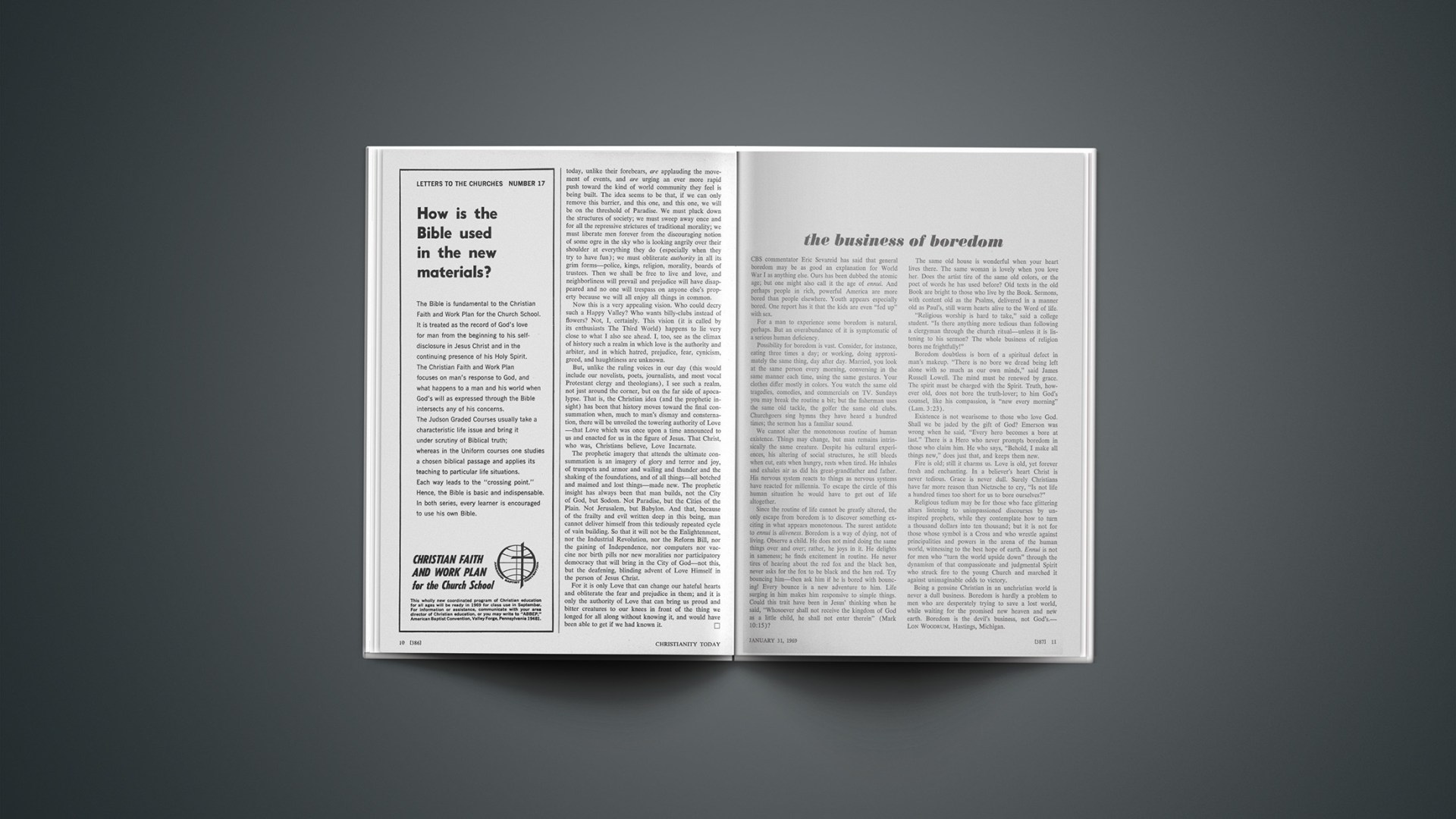CBS commentator Eric Sevareid has said that general boredom may be as good an explanation for World War I as anything else. Ours has been dubbed the atomic age; but one might also call it the age of ennui. And perhaps people in rich, powerful America are more bored than people elsewhere. Youth appears especially bored. One report has it that the kids are even “fed up” with sex.
For a man to experience some boredom is natural, perhaps. But an overabundance of it is symptomatic of a serious human deficiency.
Possibility for boredom is vast. Consider, for instance, eating three times a day; or working, doing approximately the same thing, day after day. Married, you look at the same person every morning, conversing in the same manner each time, using the same gestures. Your clothes differ mostly in colors. You watch the same old tragedies, comedies, and commercials on TV. Sundays you may break the routine a bit; but the fisherman uses the same old tackle, the golfer the same old clubs. Churchgoers sing hymns they have heard a hundred times; the sermon has a familiar sound.
We cannot alter the monotonous routine of human existence. Things may change, but man remains intrinsically the same creature. Despite his cultural experiences, his altering of social structures, he still bleeds when cut, eats when hungry, rests when tired. He inhales and exhales air as did his great-grandfather and father. His nervous system reacts to things as nervous systems have reacted for millennia. To escape the circle of this human situation he would have to get out of life altogether.
Since the routine of life cannot be greatly altered, the only escape from boredom is to discover something exciting in what appears monotonous. The surest antidote to ennui is aliveness. Boredom is a way of dying, not of living. Observe a child. He does not mind doing the same things over and over; rather, he joys in it. He delights in sameness; he finds excitement in routine. He never tires of hearing about the red fox and the black hen, never asks for the fox to be black and the hen red. Try bouncing him—then ask him if he is bored with bouncing! Every bounce is a new adventure to him. Life surging in him makes him responsive to simple things. Could this trait have been in Jesus’ thinking when he said, “Whosoever shall not receive the kingdom of God as a little child, he shall not enter therein” (Mark 10:15)?
The same old house is wonderful when your heart lives there. The same woman is lovely when you love her. Does the artist tire of the same old colors, or the poet of words he has used before? Old texts in the old Book are bright to those who live by the Book. Sermons, with content old as the Psalms, delivered in a manner old as Paul’s, still warm hearts alive to the Word of life.
“Religious worship is hard to take,” said a college student. “Is there anything more tedious than following a clergyman through the church ritual—unless it is listening to his sermon? The whole business of religion bores me frightfully!”
Boredom doubtless is born of a spiritual defect in man’s makeup. “There is no bore we dread being left alone with so much as our own minds,” said James Russell Lowell. The mind must be renewed by grace. The spirit must be charged with the Spirit. Truth, however old, does not bore the truth-lover; to him God’s counsel, like his compassion, is “new every morning” (Lam. 3:23).
Existence is not wearisome to those who love God. Shall we be jaded by the gift of God? Emerson was wrong when he said, “Every hero becomes a bore at last.” There is a Hero who never prompts boredom in those who claim him. He who says, “Behold, I make all things new,” does just that, and keeps them new.
Fire is old; still it charms us. Love is old, yet forever fresh and enchanting. In a believer’s heart Christ is never tedious. Grace is never dull. Surely Christians have far more reason than Nietzsche to cry, “Is not life a hundred times too short for us to bore ourselves?”
Religious tedium may be for those who face glittering altars listening to unimpassioned discourses by uninspired prophets, while they contemplate how to turn a thousand dollars into ten thousand; but it is not for those whose symbol is a Cross and who wrestle against principalities and powers in the arena of the human world, witnessing to the best hope of earth. Ennui is not for men who “turn the world upside down” through the dynamism of that compassionate and judgmental Spirit who struck fire to the young Church and marched it against unimaginable odds to victory.
Being a genuine Christian in an unchristian world is never a dull business. Boredom is hardly a problem to men who are desperately trying to save a lost world, while waiting for the promised new heaven and new earth. Boredom is the devil’s business, not God’s.—
LON WOODRUM, Hastings, Michigan.










